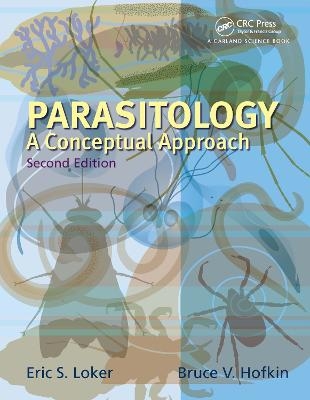
Parasitology
CRC Press (Verlag)
978-0-367-22887-3 (ISBN)
Produced amidst the still rippling effects of a pandemic and as the world experiences the increasing burden of global warming and a rapidly changing biosphere, the second edition of Parasitology: A Conceptual Approach offers a timely overview of the eukaryotic parasites affecting human health and the health of domestic and wild animals and plants. The book offers a broadly encompassing, integrative view of the phenomenon of parasitism and of the remarkable diversity of the world’s parasites. This second edition has been thoroughly updated on all aspects of parasitism, including expanded sections on parasite biodiversity, parasite genomes, the interface between parasitology and disease ecology, and applications of new techniques like CRISPR and gene drives for parasite control.
Key selling features:
Emphasis on a distinctive integrative and conceptual approach rather than the taxon-by-taxon approach used in most parasitology books
A concise, handy Rogues Gallery section that summarizes the basic biology for the most important eukaryotic parasites of humans and domestic animals, one a reader is repeatedly directed to throughout the chapters
Outstanding full-color illustrations and photographs to reinforce key points
The use of text boxes to set apart important topics or ideas that deserve special emphasis
Provision of end-of-chapter summaries, questions to test understanding and key references for those wishing to seek further information
Reference to particular URLs to highlight recent developments that often pose new and distinctive problems awaiting solution
Parasitology: A Conceptual Approach is designed for an upper-level undergraduate audience, but its readability and careful explanation of underlying scientific concepts and terminology makes it appropriate for anyone seeking a broader understanding of the impact of infectious organisms on our well-being and the changes underway in the modern world.
Eric S. Loker is Distinguished Professor of Biology, Curator of the Division of Parasites of the Museum of the Southwestern Biology, and Director of the COBRE Center for Evolutionary and Theoretical Immunology at the University of New Mexico where he has taught parasitology and related courses for many years. His research interests focus on the biology of schistosomes. Bruce V. Hofkin received his PhD from the University of New Mexico where he is currently a faculty member in the Department of Biology. His primary research interest is the epidemiology and control of vector-borne and snail-borne diseases.
1. An Introduction to Parasitism. 2. An Overview of Parasite Diversity. 3. The Parasite’s Way of Life. 4. Host Defense and Parasite Evasion. 5. Parasite vs. Host: Pathology and Disease. 6. The Ecology of Parasitism. 7. The Evolutionary Biology of Parasitism. 8. Parasites and Conservation Biology. 9. The Challenge of Parasite Control. 10. The Future of Parasitology. The Rogues' Gallery: Protozoa; Platyhelminths; Nematodes; Arthropods
| Erscheinungsdatum | 24.03.2022 |
|---|---|
| Zusatzinfo | 14 Tables, color; 265 Line drawings, color; 221 Halftones, color; 486 Illustrations, color |
| Verlagsort | London |
| Sprache | englisch |
| Maße | 210 x 280 mm |
| Gewicht | 1880 g |
| Themenwelt | Medizin / Pharmazie ► Medizinische Fachgebiete ► Mikrobiologie / Infektologie / Reisemedizin |
| Studium ► Querschnittsbereiche ► Epidemiologie / Med. Biometrie | |
| Naturwissenschaften ► Biologie ► Ökologie / Naturschutz | |
| Naturwissenschaften ► Biologie ► Zoologie | |
| ISBN-10 | 0-367-22887-4 / 0367228874 |
| ISBN-13 | 978-0-367-22887-3 / 9780367228873 |
| Zustand | Neuware |
| Informationen gemäß Produktsicherheitsverordnung (GPSR) | |
| Haben Sie eine Frage zum Produkt? |
aus dem Bereich


